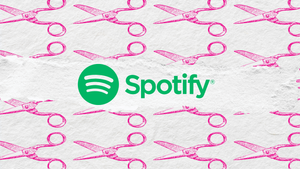Spotify this morning announced it is making about 17% of its global workforce redundant. The dramatic downsizing - which will affect around 1500 employees - is, says CEO Daniel Ek, part of a bid to build "a stronger, more efficient Spotify for the future".
"I recognise this will impact a number of individuals who have made valuable contributions”, Ek writes in a memo to his staff. “To be blunt, many smart, talented and hard-working people will be departing us". But the cutbacks are necessary, he adds, because "economic growth has slowed dramatically and capital has become more expensive".
That cost of capital is likely to be a significant issue for Spotify. Like several other major tech companies, it used surging equity markets in 2021 to raise debt financing at 0% interest. With a significantly different economic climate today, and Spotify's stock being downgraded by Citi last week, the likelihood of it being able to secure debt at those terms again is highly unlikely. Which means it may well need to pay a premium over current interest rates.
Although the company declared a small profit in its last quarterly earnings report, it also highlighted total losses of €462 million in the nine months to 30 Sep 2023, and lost €231 million in 2022 and €34 million in 2021. Unless it can find a clear track to profitably - including by cutting costs - it will have a further debt requirement and that debt will be expensive.
Noting those more favourable market conditions in 2020 and 2021, Ek admits that “we took advantage of the opportunity presented by lower cost capital and invested significantly in team expansion, content enhancement, marketing and new verticals". That resulted, he says, in a Spotify that was more resourceful but less efficient. Now it needs to be both.
It's the third round of redundancies at Spotify this year. In January, as most tech companies went through a period of downsizing, it announced that it would cut about 6% of its workforce. Then, in June, it confirmed a restructuring of its podcasting business which cut a further 2%.
Spotify pushed heavily into podcasting in 2019 - and subsequently announced a move into audiobooks as well - with ambitions to become an audio rather than music company.
It was hoped that those other content types would ultimately boost Spotify's profit margin beyond what was possible in music. However, in the short term that diversification was very expensive, with the exclusivity deal with Joe Rogan's podcast alone reportedly costing more than $200 million.
While Spotify has long prioritised growth over profitability, it has come under increased pressure from investors to demonstrate that it has a solid strategy for becoming a profitable business.
That pressure has only grown amid concerns in the investor community about Spotify's ability to maintain current growth rates and to increase average revenue per user. Analysts at Citi cited those concerns when they downgraded Spotify stock from 'buy' to 'neutral' last week.
Although still considerably below its 2021 peak, Spotify's share price has been improving this year, but those mounting investor concerns could impact on that in 2024. Ek himself has sold Spotify stock twice this year, most recently on 25 Oct when he sold 400,000 shares for $64,208,000. This followed an earlier sale of 675,000 shares on 27 Jul for $100,001,250.
In addition to investor pressure, Spotify is also facing significant competition from Apple and Amazon in big markets like the US, and TikTok's move into music streaming in emerging markets. Meanwhile, at the same time, because it is still the market leader, it gets much more public criticism than its competitors from within the music community.
Some of that is really criticism of the streaming business model more generally framed as a Spotify problem. Though some of the criticism is more Spotify specific and more justified, such as when the streaming firm splashes $310 million on a sponsorship deal with FC Barcelona, or when it unilaterally decides to implement a threshold so to divert money away from grassroots artists to the superstars and major record companies.
Elsewhere in Ek's memo, he explains the process for making so many people redundant and the support the company will offer affected employees. He also admits that the downsizing will impact on those who remain, because "a reduction of this size will make it necessary to change the way we work".
He then concludes: "Today is a difficult but important day for the company. To be very clear, my commitment to our mission and belief in our ability to achieve it has never been stronger. Just as 2023 marked a new chapter for us, so will 2024 as we build an even stronger Spotify".



